
elvis was no racist.
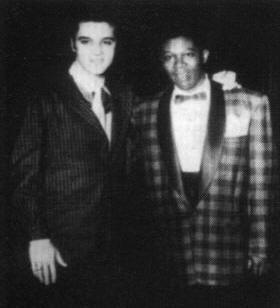 B.B King By: Lee Dawson / Elvis-Express.com The media and certain modern music stars have stated that Elvis Presley was a racist. But, renowned civil rights photographer, Ernest Withers disagrees with these unfounded comments. At 83 years old, Ernest Withers has seen it all and as a professional photographer during 1950's Memphis, he saw his fair share of racial tension and bigots, but he actually met Elvis and this is how he remembers him. One of Withers photos. Elvis & BB King in Memphis around 1957. "Elvis had this thing for music, you see, especially gospel and R&B. As Withers puts it: "He began to show up at musical events where I happened to be." In 1950's Memphis, there were very few white people who would have ever have considered going to these places. But Elvis loved to pay a visit East Trigg Avenue Baptist Church where Rev. W. Herbert Brewster, who was a renowned gospel composer, produced a show which was broadcast by WHBQ on Sunday nights. At a recent lecture Ernest told the crowd that he was a big fan of R&B and on the subject of Elvis he said "He was a mild tempered, quiet, nice guy. He treated everyone the same. There have been rumors about him, saying that he said 'The only thing blacks can do for me is shine my shoes.' Now, I don't believe that. I never saw him act in anyway like that." Ernest also commented on Elvis' sincere politeness to people he would meet. "I saw and heard him addressed everyone as 'Sir' and 'Maam', the people in the hardware store or someone like me, whoever." "I have heard reporters ask Elvis 'Why? Why do you say 'Yes, sir' to those stupid nig***s?' and Elvis would say to them 'Cause they're humans too.' He just was respectful to all people, and not just because they were older than him, cause that's what you're supposed to do. He had respect for "I could relate and talk to Elvis easier than even the Civil Rights activists because I was his age and he was more even tempered. Elvis would come to the black events and the Goodwill Review, but officially, he was not able to actually be part of it because of the segregation laws and things at the time. He would still come though." 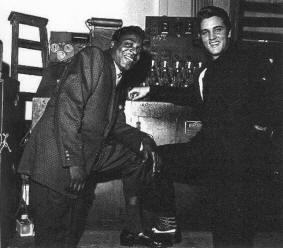 Brook Benton This was during a time when the established order was unconcerned if a white man was dismissive of a black man, but the civil rights photographer was impressed with young Elvis and remembers him with great fondness. Withers saw something totally different in Elvis to other white people in Memphis at that time. "Elvis was very fond of Walter Culpepper who ran a barbecue shop on Hernando Street." Elvis always referred to the black proprietor as "Mr. Culpepper." Withers says, "I overheard one of Elvis' friends at the time ask Elvis 'Why do you call him 'mister' -- he's just a barbecue guy?' Elvis looked at him and said 'He's a man.' " "That," Withers says, "Was the humility in his temperament." One classic Withers picture was taken at a march for Martin Luther King a few days after he had been killed in 1968. These people were marching in front of a movie theater that, just ironically, was playing "Stay Away Joe" and said Elvis Presley in big letters above it. "Elvis was a great man and did more for civil rights than people know. To call him a racist is an insult to us all." In 1957, a magazine printed a lie about Elvis, not the
first one, not the last one, but one that has been often
passed on through the years and at times artists of today
like to throw out the slur when needing a headline, so there
are those that believe Elvis was racist. Yes, we know that
the notion that Elvis was a racist is preposterous. It's as
stupid now as it was then, but here is our definitive
response to this nonsense. 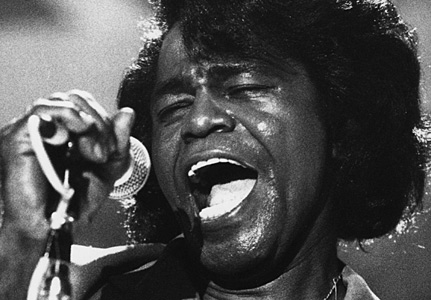 James Brown
Shortly after Elvis died, James Brown recorded Love Me
Tender as the b-side of his hit record The Spank. Brown did
this touching spoken intro: 'I want to talk about a good
friend I had for a long time and a man I still love, Brother
Elvis Presley. You know, if he were here right now, I'm sure
he would say the same thing for me. I loved the man and he
was truly the king of rock and roll. We've always had kind
of a toss up. Elvis and I. The King of Rock And Roll and I'm
the King of Soul. So I wanted to say this for the people,
Elvis, and myself'. |
||||
|
|
| Top of Page | | | Louderdale courts | | ||
ELVIS WAS NOT A RACISTBy Piers Beagley / Elvis Information Network "I wasn’t just a fan, I was his brother. Last time I saw Elvis alive was at Graceland. We sang ‘Old Blind Barnabus’ together, a gospel song. I love him and hope to see him in heaven. There’ll never be another like that soul brother." – James Brown. 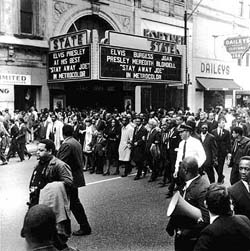 Civilright "Elvis was an integrator. Elvis was a blessing.
They wouldn’t let Black music through. "On a scale of one to ten, I would rate Elvis eleven." – Sammy Davis Jnr. Introduction - Elvis Was Not A Racist! Let's get two things straight from the start. Firstly Elvis’ supposed 1957 "racist comment" that is often bandied about has never been verified and seems highly unlikely considering the timing, as well as Elvis' deep involvement with the black music of the era. Elvis was even was challenged about the statement by a reporter on the set of Jailhouse Rock. Elvis said, "I never said anything like that, and people who know me know that I wouldn’t have said it." Secondly the Chuck D quote (from Public Enemy’s ‘Fight The Power’) is again regularly used to denigrate Elvis but is never fully explained. What Chuck D actually says - should anyone bother to ask him or check the facts – is that what he actually disliked was Elvis’ "culture-blurring genius". This is because it happened to play into the hands of a racist music industry that, at the time, was hungry for a white artist who could play black music. Chuck D in fact agrees & says that, "Elvis was a door, a gateway through to the roots. In the beginning of his career Elvis admitted where the roots came from, but did anybody care?" 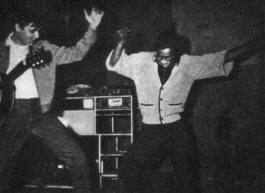 Saqmmy Davis jr The Southern States - Some Background Actually it should be more of a surprise that Elvis did grow up with so little prejudice, after all the Southern US States were still colour segregated into the sixties. How easy to forget that it wasn’t until the mid-sixties that The Civil Rights March and Martin Luther King's "I Have a Dream" speech occurred. It is a sad historical fact that even after The Beatles and the new ‘freedom of the sixties’ President Lyndon Johnson still had to force the Civil Rights Act of 1964 through Congress over fierce opposition from Southern legislators. We have to remember that this was the political atmosphere that Elvis was living in. Like all of us, Elvis would have been brought up surrounded by family prejudices (Vernon was known to be very anti-Semitic) but even these, according to Memphis Mafia members, did not affect Elvis. Lamar Fike says, "Elvis had a good heart and fortunately was nowhere near his family in his beliefs. He recognized that he met many people in those ethnic groups that he liked and he was always respectful and courteous to all people who were the same to him". Another fact is that in 1960, even in the supposed egalitarian atmosphere of a southern Democratic Convention, Sammy Davis Jnr was booed not only because he was black but also that he had dared become engaged to a white woman (actress May Britt). Sammy Davis was even asked by the Democrats to postpone his marriage until after the election, which he did. But even then he was snubbed & asked not to attend Kennedy’s inauguration! Sammy Davis Jnr was a long-term friend of Elvis’ and details like these help one understand the political & racist pressure of the era even on well-known celebrities – and this was from The Democrats. Heaven forbid you consider the racist ideals of any other political party! "Early on somebody told me that Elvis was black. And I said ‘No, he’s white but he’s down-home’. And that is what it’s all about. Not being black or white it’s being ‘down-home’ and which part of down-home you come from." – Sammy Davis Jnr. Early Days - Beale Street & Sun Studio However, more than anything, Elvis’ opinions and beliefs would had to have been influenced by growing up in a poor Southern community spending his early years absorbing the music of local impoverished black communities like Shake Rag in Tupelo and, later on, the Beale Street area of Memphis. Unlike most white teenagers Elvis would delight in attending the coloured East Trigg Baptist Church where he would hear Reverend Brewster’s stirring sermons along with the local black gospel music. Elvis would even slip away from his own First Assembly church meetings to be one of the few whites attending the East Trigg services. "Elvis loved gospel music. He was raised on it. And he really did know what he was talking about. He was singing Gospel all the time – almost anything he did had that flavour. You can’t get away from what your roots are." – Cissy Houston. Elvis would later spend time in Beale Street, the cultural capital of Memphis’ large black community, absorbing the local blues and their styles. It was there in 1954 that Elvis saw Lowell Fulson at Club Handy performing his brand new composition ‘Reconsider Baby’, a song that Elvis would continue to perform throughout his career. Walking down Beale Street Elvis would spend what money he had on the exciting local fashions he saw in Lansky’s shop front window. Wearing his favorite colors of pink & black Elvis would even challenge his white neighbours by dressing in the outlandish Beale Street styles. In fact the key to Elvis' attraction was that he was such a musical & cultural mixing pot that he had to appeal to any innovative teenager. "I knew Elvis before he was popular. He used to come around and be around us a lot. I can remember once or twice when we met down at Club Handy on Beale Street. Elvis at heart was very religious and I think that throughout his career he couldn’t help but let it come out & you can hear it." – B.B King. Early in Elvis’ recording career it was of course his respect & understanding of local black music & culture that made him & Sam Phillips such kindred spirits. Although obviously rare for that era & the Southern States region, both had beliefs in black culture & the equality of man. Sam Phillips said, "The lack of prejudice on the part of Elvis Presley had to be one of the biggest things that could have happened to us. " Throughout the years Elvis always showed his appreciation for his black musical roots. In his 1954 Sun Studio’s ‘Million Dollar’ jam Elvis spoke about his admiration of singer Jackie Wilson who Elvis believed had outdone him with a better version of ‘Don’t Be Cruel’. Elvis latter acknowledged Wilson’s style & footwork when he filmed ‘Return To Sender’ for the film ‘Girls, Girls, Girls’. When Jackie Wilson had a stroke in 1975 leaving him unable to perform and hospitalized, Elvis covered a large proportion of Wilson’s medical bills. A lot of people have accused Elvis of stealing the black man’s music, when in fact, almost every black solo entertainer copied his stage mannerisms from Elvis." - Jackie Wilson. In 1956 Elvis appeared on the WDIA black radio station’s annual fund-raiser for "needy Negro children" at Memphis’ Ellis Auditorium. Elvis performed alongside some of his own heroes, Ray Charles, B.B King & Rufus Thomas. There was no doubt that Elvis was seen as a champion in the black Memphis community & his concert audiences were certainly not all white as is often believed. The Pittsburgh Courier described the reaction that night as, "A thousand black, brown and beige teen-age girls in the audience blended their alto & soprano voices in one wild crescendo of sound that rent the rafters... and took off like scalded cats in the direction of Elvis Presley." "I remember Elvis as a young man hanging around the Sun studios. Even then, I knew this kid had a tremendous talent. He was a dynamic young boy. His phraseology, his way of looking at a song, was as unique as Sinatra's. I was a tremendous fan, and had Elvis lived, there would have been no end to his inventiveness." - B.B. King The Later Years - I Have A Dream / If I Can Dream Elvis always expressed his respect to other performers, for instance Chuck Berry, Fats Domino, Little Richard, Mahalia Jackson & Junior Parker, who had influenced his own music. Singer Roy Hamilton was another of Elvis' idols. During the 1969 Memphis sessions Elvis was delighted to meet Roy and they talked for a while. As a show of appreciation Elvis presented Hamilton with a beautiful new song ‘Angelica’ that he was going to record himself. "Describe Elvis Presley? He was the greatest who ever was, is, or will ever be." - Chuck Berry. Another of Elvis’ friends James Brown is re-known for having an incredibly strong personality, supporting the struggle for Black Rights, and someone who wouldn't take any racist bullshit off anyone he met. Coincidentally James Brown was charting with ‘Say it Loud, I'm Black & I'm Proud’ at the same time Elvis was recording 'In The Ghetto'. There would be no chance of James Brown spending anytime with Elvis had he shown any racist tendencies and they stayed friendly acquaintances throughout the years. James Brown was so moved by Elvis' death that he requested, and was allowed, time alone with Elvis as he lay in his coffin at Graceland. James Brown was also the first entertainer to arrive at Elvis' funeral. "We were friends for a long time, for twenty years. And he told me, he’d ride around Memphis around the streets he’d come up in, all alone at night. Ride around on his motorcycle when he was sure the rest of the world was asleep, just kind of hauntin’ them places he hung around in as a kid. He was a country boy." – James Brown. In today’s rap dominated popular culture it is too easy to forget how much Elvis did to help with the cultural integration of popular music. At the time Elvis started there was a real rejection of black culture from post-war White middle-America and from all sides of the white community. Even the radio stations were segregated and Elvis had to take a lot of criticism just for singing the music he loved & grew up with. "Elvis had an influence on everybody with his musical approach. He broke the ice for all of us." – Al Green. In the seventies Elvis' personal choice of insisting that The Sweet Inspirations became his backup group once he went back to touring also says a lot. In 2003 EIN interviewed Myrna Smith and asked her about the tabloid slurs and comments about Elvis' supposed racism. EIN - Some people like to make out that Elvis was racist in some ways. Is the story true that on a Texan Tour the promoters didn't want Elvis working with black backing singers and Elvis made the stand saying, "No Sweets, No Elvis"? Myrna Smith -"That's what we heard. And the promoter's daughter was made to drive us in an open convertible to the stage! So that promoter never defied Elvis again! In fact I don't think that we never worked with him again anyway. I know that no matter what color I was Elvis would have loved me the same. As far as he treated me, there was not racial bone in his body. I mean in the early days he even sneaked into those black gospel churches in Memphis which would have taken a lot of nerve. White boys just wouldn't go there, it was a brave thing to do but he was just determined." Considering this it is not surprising that Martin Luther King’s ‘I Have A Dream’ was a favorite rhetorical speech that Elvis had memorized and would often repeat over the years. Elvis was extremely shocked when on April 4th 1968 Martin Luther King was assassinated in his own hometown. The compassion Elvis felt would lead to the inspired performance that Elvis used in his own ‘If I Can Dream’ as the closing number of his ‘Comeback Special.’ The Colonel unwisely would have preferred a Christmas song! The black struggles following Martin Luther King’s assassination created strong racial boundaries especially in Memphis and the South. Politically and racially 1969 was a very sensitive period. However Elvis had always felt strongly about social injustice (as shown by his private donations to charities) and there is no doubt that his recording of ‘In The Ghetto’ was Elvis’ way of saying which side he sympathized for. "I have a respect for Elvis and my friendship. It ain’t my business what he did in private. The only thing I want to know is, ‘Was he my friend?’, ‘Did I enjoy him as a performer?’, ‘Did he give the world of entertainment something?’ - and the answer is YES on all accounts. The other jazz just don’t matter." – Sammy Davis Jnr. 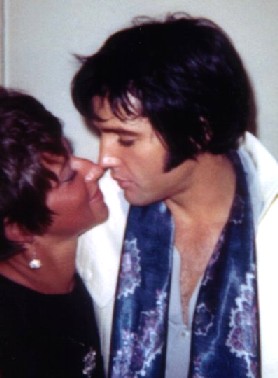 A picture is worth a Thousand words Even to the very end Elvis would record songs reflecting his black roots for instance 'Hurt’ by Roy Hamilton, ‘Shake A Hand’ by Faye Adams & ‘Pledging My Love’ by Johnny Ace. "Elvis was my close personal friend. He came to my Deer Lake training camp about two years before he died. He told us he didn't want nobody to bother us. He wanted peace and quiet and I gave him a cabin in my camp and nobody even knew it. When the cameras started watching me train, he was up on the hill sleeping in the cabin. Elvis had a robe made for me. I don't admire nobody, but Elvis Presley was the sweetest, most humble and nicest man you'd want to know." - Muhammad Ali. I strongly believe that if Elvis Presley was alive today a contemporary album which looked back and acknowledged his Gospel and Blues roots would be one of his best & most impassioned releases in years - But one can only dream. | Prev. | Top of Page |
||||